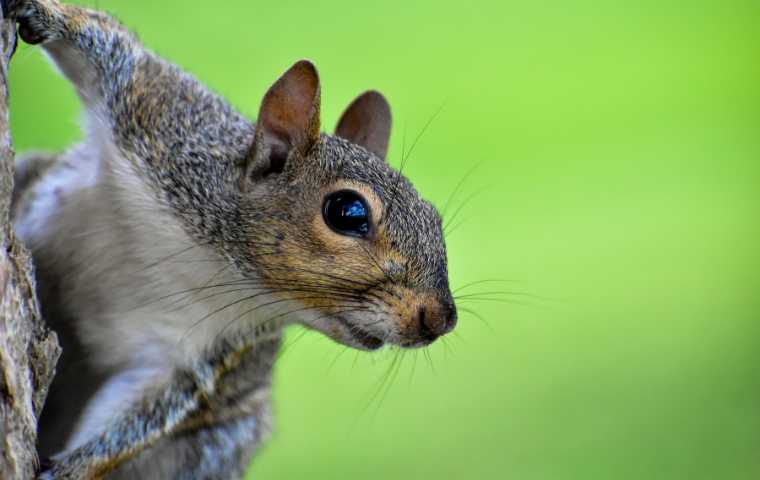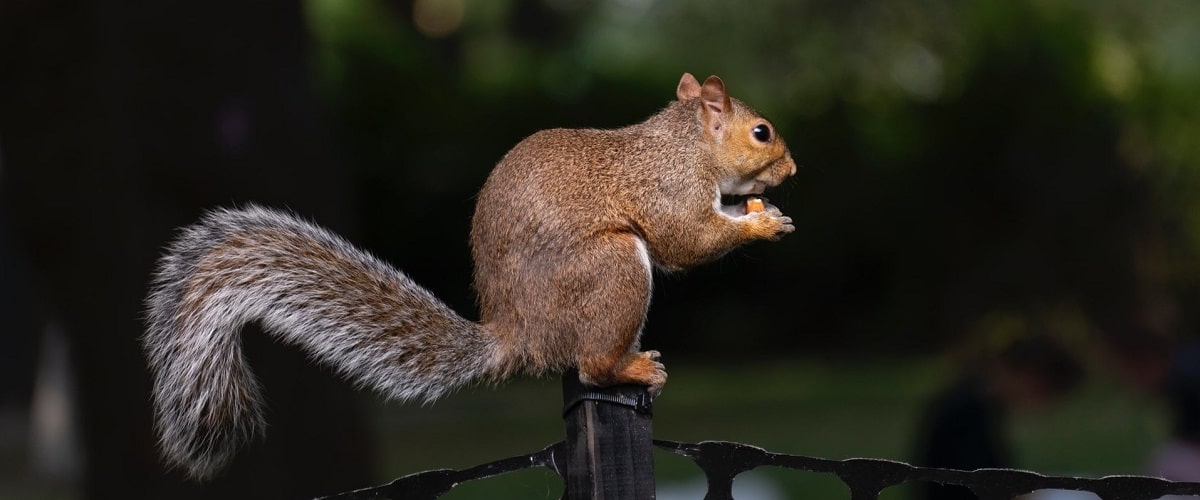
The average lifespan of a squirrel is 6 to 12 years. This varies based on species and environmental conditions.
Squirrels, those agile and bushy-tailed rodents, are a common sight in many parts of the world. They belong to the family Sciuridae, which includes small or medium-sized rodents. Squirrels can be found in forests, urban areas, and suburban neighborhoods. Their lifespan is influenced by various factors, such as predation, habitat, and availability of food.
Squirrels are known for their intelligence, quick reflexes, and ability to adapt to different environments. Understanding their lifespan and behavior helps in appreciating these fascinating creatures. Their presence in ecosystems plays a crucial role, especially in seed dispersion and forest regeneration.
Introduction To Squirrel Lifespan
Squirrels are fascinating creatures found almost everywhere. Understanding their lifespan helps us appreciate their role in nature. The lifespan of a squirrel varies based on species and environment.
Wild squirrels face many dangers which can affect their lifespan. In captivity, they often live longer due to fewer threats.
Common Myths
Many people believe squirrels live only a few years. This is not true. Let’s debunk some common myths:
- Myth 1: Squirrels only live for 1-2 years.
- Truth: Wild squirrels can live up to 6-12 years. In captivity, they can live up to 20 years.
- Myth 2: All squirrels have the same lifespan.
- Truth: Different species have different lifespans. For example, red squirrels live shorter lives compared to grey squirrels.
Importance Of Lifespan Study
Studying the lifespan of squirrels is important for several reasons:
- Conservation Efforts: Knowing their lifespan helps in protecting endangered species.
- Ecosystem Balance: Squirrels play a key role in forest regeneration.
- Scientific Research: Understanding their lifespan aids in medical and biological studies.
Here is a table summarizing the average lifespans of different squirrel species:
| Species | Average Lifespan (Wild) | Average Lifespan (Captivity) |
|---|---|---|
| Grey Squirrel | 6-12 years | 20 years |
| Red Squirrel | 3-7 years | 10 years |
| Ground Squirrel | 2-4 years | 10 years |
Factors Affecting Lifespan
Squirrels, like many animals, have varying lifespans influenced by different factors. Understanding these factors can help us appreciate the challenges they face. Below, we explore the main factors affecting the lifespan of squirrels.
Diet And Nutrition
A squirrel’s diet greatly impacts its lifespan. Squirrels need a balanced diet. They eat nuts, seeds, fruits, and sometimes insects. Quality food helps them stay healthy. Poor nutrition can lead to diseases. Healthy squirrels live longer. Malnourished squirrels face many health issues.
Predators And Threats
Predators pose a significant threat to squirrels. Common predators include hawks, owls, and snakes. Domestic pets like cats and dogs also hunt squirrels. Traffic is another major threat. Many squirrels die from car accidents. Predators and threats reduce their average lifespan.
Habitat Conditions
The habitat where a squirrel lives also affects its lifespan. Urban areas can be dangerous due to cars and less food. Forests provide more natural food and shelter. Weather conditions play a role too. Harsh winters can be tough on squirrels. Good habitat conditions support longer lifespans.
Different Species, Different Lifespans
Understanding the average lifespan of a squirrel requires looking at different species. Each species has unique characteristics that affect their longevity. In this section, we will examine the lifespans of tree squirrels, ground squirrels, and flying squirrels.
Tree Squirrels
Tree squirrels are the most common type found in urban and suburban areas. They often live in trees and are known for their agility. The average lifespan of a tree squirrel in the wild is around 6 to 12 years. In captivity, they can live up to 18 years. Factors like predators and availability of food play a role in their lifespan.
Ground Squirrels
Ground squirrels live on the ground and prefer open fields and meadows. They have a shorter lifespan compared to tree squirrels. The average lifespan of a ground squirrel is 2 to 4 years. Ground squirrels face threats from predators and human activities. Some species hibernate, which can affect their lifespan.
Flying Squirrels
Flying squirrels are unique due to their ability to glide between trees. They live in dense forests and are nocturnal. The average lifespan of a flying squirrel is 5 to 8 years in the wild. In captivity, they can live up to 10 years. Their lifespan is influenced by their nocturnal lifestyle and fewer predators.
| Species | Average Lifespan (Wild) | Average Lifespan (Captivity) |
|---|---|---|
| Tree Squirrels | 6 to 12 years | Up to 18 years |
| Ground Squirrels | 2 to 4 years | Not Common |
| Flying Squirrels | 5 to 8 years | Up to 10 years |
Each species of squirrel has different lifespans. Factors such as habitat, diet, and predators influence these lifespans. Knowing these differences helps in understanding the life of squirrels better.

Credit: critterstop.com
Lifespan In The Wild Vs. Captivity
Understanding the average lifespan of a squirrel can be fascinating. The environment plays a significant role in determining how long these creatures live. Let’s explore the differences between their lifespan in the wild and in captivity.
Wild Environment Challenges
Squirrels face numerous challenges in the wild. Predators such as hawks, snakes, and foxes are constant threats. Harsh weather conditions can also shorten their lifespan. Additionally, finding food can be difficult, especially in winter.
Diseases and infections are common in wild squirrels. These health issues can significantly reduce their lifespan. Many wild squirrels live only about 1-2 years due to these factors. However, some may live up to 6-12 years if they survive these challenges.
Benefits Of Captivity
Squirrels in captivity often live longer. They are protected from predators and harsh weather. They have regular access to food and clean water.
Captive squirrels receive medical care. This helps prevent and treat diseases. As a result, their lifespan can extend up to 10-20 years.
| Environment | Average Lifespan |
|---|---|
| Wild | 1-6 years |
| Captivity | 10-20 years |
Signs Of Aging In Squirrels
Understanding the signs of aging in squirrels helps in caring for them. Squirrels, like all animals, show aging through physical and behavioral changes.
Physical Changes
As squirrels age, their bodies undergo noticeable changes. Physical signs of aging include:
- Graying fur: Older squirrels often have gray patches on their fur.
- Weight loss: Aging squirrels may become thinner and lose muscle mass.
- Decreased mobility: They might move slower and have trouble climbing trees.
- Dental issues: Worn-down teeth can make eating difficult.
Behavioral Changes
Behavioral changes are another sign of aging in squirrels. Older squirrels may exhibit:
- Less active: They often play less and rest more.
- Foraging habits: They might have difficulty finding food.
- Increased caution: Older squirrels can become more wary of predators.
- Social interaction: They might spend less time with other squirrels.
Recognizing these signs helps in providing better care for aging squirrels. Paying attention to their physical and behavioral changes ensures they age comfortably.
Research Studies On Squirrel Lifespan
Understanding the lifespan of squirrels is crucial for wildlife enthusiasts. Researchers have conducted various studies to determine how long squirrels live. These studies provide insight into the factors affecting squirrel longevity.
Notable Studies
Several researchers have focused on squirrel lifespan. Notable studies have been conducted by universities and wildlife organizations. These studies often include data from field observations and lab research.
- University of Michigan: Conducted a 10-year study on squirrel populations.
- National Wildlife Federation: Focused on urban vs. rural squirrel lifespans.
- Smithsonian Institution: Studied the impact of predators on lifespan.
Key Findings
The studies have revealed several key findings about squirrel lifespan. Here are some important discoveries:
- Average lifespan in the wild: 6-12 years.
- Squirrels in captivity can live up to 20 years.
- Urban squirrels often live shorter lives due to traffic hazards.
- Predation is a major factor in rural squirrel mortality.
Researchers found that diet and habitat significantly affect lifespan. Squirrels with access to varied diets lived longer. Those living in safer environments also had increased lifespans.
| Factor | Impact on Lifespan |
|---|---|
| Diet | Varied diet increases lifespan. |
| Habitat | Safer environments lead to longer lives. |
| Predation | Predators decrease lifespan. |
| Human Activity | Urban areas reduce lifespan due to hazards. |
These findings help in understanding how to protect and support squirrel populations. They highlight the importance of habitat conservation and safe environments for these animals.
Conservation And Lifespan
Squirrels are charming creatures found in various parts of the world. Their lifespan can be influenced by many factors. Conservation efforts play a significant role in determining their longevity. Let’s delve into how conservation impacts the lifespan of these delightful animals.
Conservation Efforts
Conservation efforts are essential to protect squirrels from threats. These efforts include creating safe habitats and reducing human activities that harm them. Governments and organizations work together to ensure squirrels thrive. They establish protected areas where squirrels can live and breed safely.
Community involvement is also crucial. People can help by not disturbing squirrel habitats. Planting native trees and reducing pesticide use can make a big difference. Education programs teach children and adults the importance of protecting these animals.
Impact On Lifespan
Conservation efforts have a direct impact on the lifespan of squirrels. In protected areas, squirrels have access to more food and safer living conditions. This can lead to a longer life.
Research studies show that squirrels in well-conserved areas live longer. They face fewer predators and have better shelter. This reduces stress and improves their overall health.
Below is a table showing the average lifespan of squirrels in different conditions:
| Condition | Average Lifespan (Years) |
|---|---|
| Urban Areas | 3-5 |
| Protected Areas | 5-10 |
| Wild Forests | 4-7 |
In summary, conservation efforts are vital for extending the lifespan of squirrels. By protecting their habitats and reducing threats, we ensure these animals can live longer and healthier lives.

Credit: www.trutechinc.com
Interesting Facts About Squirrel Lifespan
Squirrels are fascinating creatures with various lifespans depending on the species. Understanding their lifespans can help us appreciate these nimble rodents even more. Below are some intriguing facts about the lifespan of squirrels.
Record Lifespans
Squirrels in the wild typically live for about 6-12 years. However, some have lived much longer in captivity. For instance, the oldest recorded squirrel lived for an impressive 20 years. This longevity is due to better care and fewer predators.
Comparative Analysis
Comparing squirrel lifespans with other rodents, they tend to live longer. Mice and rats often live only 2-3 years. Hamsters live around 2-4 years. This makes squirrels quite unique among small mammals.
| Animal | Average Lifespan (Years) |
|---|---|
| Squirrel (Wild) | 6-12 |
| Squirrel (Captivity) | Up to 20 |
| Mouse | 2-3 |
| Rat | 2-3 |
| Hamster | 2-4 |
Several factors influence a squirrel’s lifespan. These include diet, predators, and environment. Squirrels that have access to a healthy diet and live in predator-free areas tend to live longer.
- Diet: Squirrels with ample food resources live longer.
- Predators: Fewer predators mean a higher chance of survival.
- Environment: A safe environment increases lifespan.
By understanding these factors, we can better appreciate the resilience and adaptability of squirrels in various conditions.

Credit: animals.howstuffworks.com
Frequently Asked Questions
How Long Do Squirrels Live In The Wild?
Squirrels in the wild typically live for 6 to 12 years. Factors like predators and food availability impact their lifespan.
What Is The Lifespan Of A Pet Squirrel?
Pet squirrels can live up to 20 years. They benefit from a controlled environment, regular food, and fewer predators.
Do Different Squirrel Species Have Different Lifespans?
Yes, different species have varying lifespans. For example, Eastern Grey Squirrels live up to 12 years, while Red Squirrels live around 5 years.
How Does Environment Affect Squirrel Lifespan?
A squirrel’s environment significantly affects its lifespan. Urban areas may offer more food but also more hazards, like traffic.
Conclusion
Understanding the average lifespan of a squirrel helps in appreciating these fascinating creatures. Lifespan varies by species and environmental factors. Typically, squirrels live between 6 to 12 years. Knowledge of their lifespan aids in better wildlife conservation efforts. Enjoy observing these lively animals and contribute to their well-being.
Learn More About Grilling
If you want to learn more about grilling, check out these other helpful resources!





